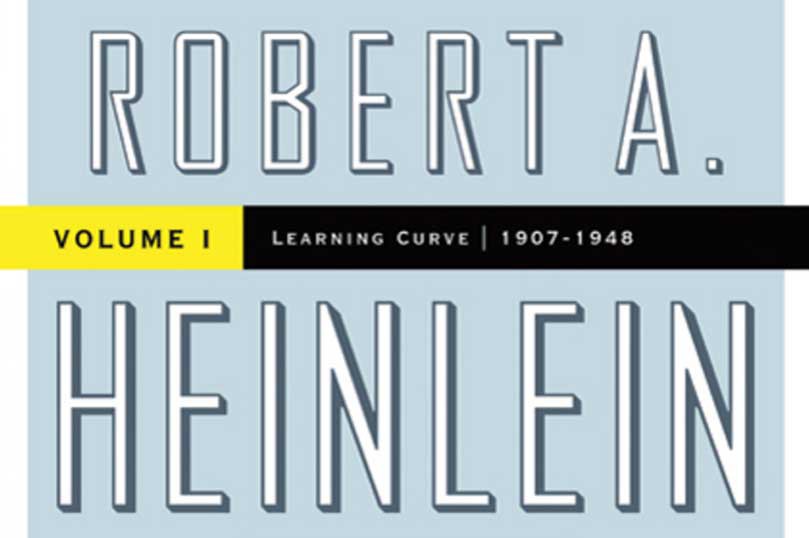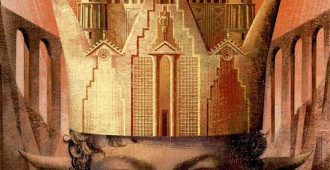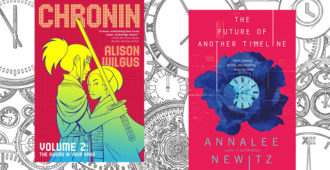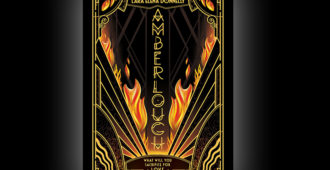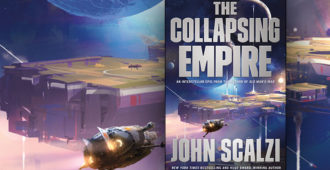Welcome to Throwback Thursdays on the Tor/Forge blog! Every other week, we’re delving into our newsletter archives and sharing some of our favorite posts.
In 2010, we published the first of a two volume biography of one of the giants of science fiction: Robert A. Heinlein. At that time, we had an idea: why not ask our authors about their favorite Heinlein novels? Tor editor Stacy Hill was our shepherd for this series, and introduces us to our first guest: science fiction author and futurist David Brin.
From Tor editor Stacy Hill: Sometimes, a topic comes along that’s just too big for one article.
In August, Tor will be releasing an all-new, first-ever authorized biography of a towering figure in the history of the genre: Robert A. Heinlein.
So, as our own little celebration of the man and his works, we thought it would be fun to find out just how much of an impact Heinlein’s stories and novels had on a number of our—and your—favorite sf writers. We asked them a simple question—what’s your favorite Heinlein novel?
We’ll be posting their answers once a week as we build toward publication of the biography, and I hope all of you will jump in and let us know if you have any favorites, too.
But enough about us.
What’s Your Favorite Heinlein Novel, David Brin?
Heinlein and Beyond This Horizon
RAH was a question-asker.
I consider Robert Heinlein’s most fascinating novel to be his prescriptive utopia Beyond This Horizon. (A prescriptive utopia is where an author “prescribes” what he or she believes a better civilization would look like.) While Heinlein did opine, extensively, about society in many books, from Starship Troopers to Glory Road, it is in Beyond This Horizon (BTH) that you’ll find him clearly stating This Is The Way Things Ought To Be. And it turns out to be a fascinating, surprisingly nuanced view of our potential future.
Like most Heinlein novels, Beyond This Horizon divides pretty evenly into two parts and it is only the second half that I hold in high regard. Heinlein wrote the first half at behest of the famed editor of Astounding Magazine, John W. Campbell, who was then holding forth on one of his favorite themes…that “an armed society is a polite society.”
In pushing this strange notion, Campbell was behaving very much like his arch-nemesis, Karl Marx. A few anecdotes and a good just-so story outweigh a hundred historical counter-examples. But no matter. Heinlein did as good a job of conveying Campbell’s idea in fiction as anybody could. So much so that the first half of Beyond This Horizon has been cited by state legislators in both Texas and Florida, proposing that all citizens to go around armed! Naturally, this leads (paradoxically) to a wild shoot-em-up, in the first half of Beyond This Horizon…which RAH suddenly veers away from at the midway point.
This division between halves is typical of Heinlein novels and it makes reading them an interesting, multi-phase experience. Generally, RAH was a master at starting his tales–in fact, I recommend that all neo writers study carefully the first few pages of any Heinlein tale, for his spectacularly effective scene-setting and establishment of point-of-view. (The opening scene of The Star Beast is the best example of show-don’t-tell that anyone can find.) Alas, most of his novels reach a vigorous climax, concluding part one…and then peter out disappointingly in the last half, amid a morass of garrulous talk.
But this is where Beyond This Horizon reverses all expectations. Sure, part one is action and part two is talk, as usual…only in this case, the action is silly and the talk is terrific! In fact, this is where Robert Heinlein displays how broad his intellectual reach can take us.
Here we see the clearest ever expression of his political philosophy, which is demonstrably neither “fascist” nor anywhere near as conservative as some simpleminded critics might have us think. Indeed, his famed libertarianism had limits, moderated and enriched by compassion, pragmatism and a profound faith that human beings can improve themselves, gradually, by their own diligence and goodwill.
I was amazed by many other aspects of this wonderful book-within-a-book, especially by Heinlein’s startlingly simple suggestion for how to deal with the moral quandaries of genetic engineering — what’s now called the “Heinlein Solution” — to allow couples to select which sperm and ova they want to combine into a child, but to forbid actually altering the natural human genome. Thus, the resulting child, while “best” in many ways (free of any disease genes, etc), will still be one that the couple might have had naturally. Gradual human improvement, without any of the outrageously hubristic meddling that wise people rightfully fear. It is a proposal so insightful that biologists 40 years later are only now starting to discuss what may turn out to be Heinlein’s principal source of fame, centuries from now.
When it comes to politics, his future society is, naturally, a descendant of the America Heinlein loved. But it has evolved in two directions at once. Anything having to do with human creativity, ambition or enterprise is wildly competitive and nearly unregulated. But where it comes to human needs, the situation is wholly socialistic. One character even says, in a shocked tone of voice: “Naturally food is free! What kind of people do you take us for?”
None of this fits into the dogma of Ayn Rand, whose followers have taken over the libertarian movement. If Robert Heinlein was a libertarian, it was clearly of a more subtle kind, less historically or anthropologically naive, more compassionate… and more interesting
But here’s the crux. For the most part, with Robert Heinlein, you felt he wasn’t so much lecturing or preaching as offering to argue with you! His books let you fume and mutter and debate with this bright, cantankerous, truly American soul, long after his body expired. And this joy in argument–in posing and chewing over thought experiments–is the very soul of what it means to be a writer or reader of science fiction.
This article is originally from the July 2010 Tor/Forge newsletter. Sign up for the Tor/Forge newsletter now, and get similar content in your inbox twice a month!

